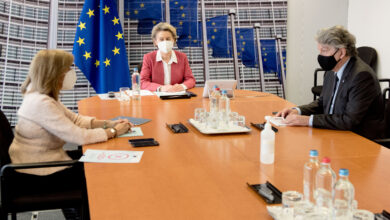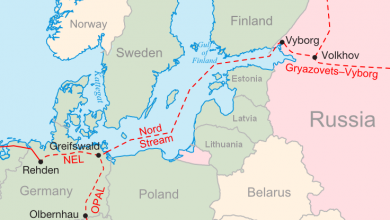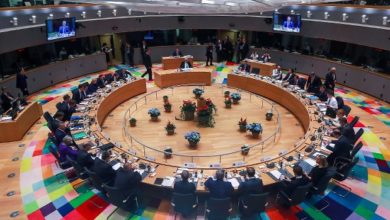[OPINION] The European Union Needs its Own Nuclear Arsenal
And why Macron is angling for a nuclear-sharing agreement instead

Nuclear weapons have been an ambivalent part of human history and international politics for the past 75 years. Aside from climate change, nuclear weapons are the only currently existing and known threat capable of destroying civilisation. Over the decades, grassroots movements have coalesced against them and their deployment. Several countries have developed them, agreed to limit their spread, and averted crises that might have resulted in world destruction. But the deterrence they offer has also made conventional war between industrialised countries less likely, and security studies and great power competition have developed around the issue. With the nuclear genie out of the bottle, reaping the benefits of deterrence while managing the risks of escalation is imperative.
Europe’s Nuclear Dilemma
All of this is of great interest to Europe, which has been a springboard for nuclear weapons for all of the aforementioned seventy-five years. Brexit, in particular, has brought the issue to the fore again. The departure of the United Kingdom from the European Union has been discussed in painstaking detail, and so have its many ramifications and consequences. One field that is often overlooked by the general audience, however, is the consequences Brexit is going to have on European security, and especially in one specific area of European security – nuclear deterrence. After the British departure, France is the sole EU Member State with nuclear capabilities. The situation is aggravated by Trump’s erratic and unpredictable foreign policy.
This is not lost on European leadership. For the past four years, the EU and its Member States have devoted an unusual amount of attention to the question of military integration. There have been more than just words, too. New common military projects, like PESCO and the European Defence Fund, have given a real incentive to cooperation between Member States. However, all these new developments primarily provide monetary incentives for joint defence procurement and make it easier to deploy troops across the EU. They do not even touch on questions of national defence spending, let alone on high politics and strategic culture, and leave out several glaring omissions – like nuclear deterrence.
There is good reason for these omissions. The EU is effectively built to make bargains possible and fruitful, and to avoid leadership at all costs. This has several advantages – notably, small Member States such as Malta or Cyprus get their voice amplified, avoiding a monopoly of the larger States. The reliance on institutional compromise is what makes grand bargains possible. This is a very effective scheme for overall European integration. However, it is a terribly unsuited one for military integration, which requires a chain of command, clear and fast decision-making, and centralised leadership. Nowhere is this truer than in the management of a country’s nuclear arsenal.
French President Macron was the first head of government to acknowledge the nuclear elephant in the room. He has recently made headlines with his call for a European debate on the French nuclear deterrent, but the precise intention behind his words remains unclear. It cannot be taken for granted that France will commit a national resource to wider Union defence with such high stakes, to the point of considering a nuclear threat to any EU Member State as a nuclear threat to France’s own soil. But what his words have done is to make clear beyond any possible equivocation that European institutions and governments must treat this as a very real, and very serious policy question. The departure of the UK, and the growing uncertainty surrounding NATO, present a twin problem: part of it is strategic, the other part political.

The Strategic Problem
The security situation in the West increasingly resembles the Cold War. This might come as a surprise to readers, who are used to a different narrative regarding foreign policy and military matters. With the Cold War over, it is true that the West in general and NATO, in particular, focused away from containing the dissolving Soviet Union, and toward military intervention all over the world. The last decade, however, has largely reverted the trend.
Russia is ahead of all of Europe in military capabilities. This might not be apparent from looking at government budgets and defence spending. Indeed, the Russian defence budget is low in absolute terms, although it’s a high share of the country’s GDP. Spending, however, does not linearly translate into capabilities. The high availability of raw materials, low salaries and procurement costs, along with other factors, make the Russian military comparatively cheap to run and build up.
All Russian armed forces are still beleaguered by a host of technical and organisational problems, and many of their flashy new pieces of equipment serve more for marketing purposes than for the actual battlefield. In capabilities, however, Russia is still ahead of continental Europe, at a time when European governments have been neglecting their own defence. This means the gap is widening. Crucially, Russia is able to conduct combined arms operations, something that can’t be said for any European military at the time of writing.
In response, Western countries are shifting focus once more, away from intervention and towards a more classical emphasis on territorial defence. This new situation means that everyone can re-evaluate their position, and the Trump administration has been doing just that. Further, the intensified rivalry between the USA and Britain on one hand, and the EU on the other, has weakened certainties that there would be a common nuclear deterrence. Transatlantic politics have shifted in a way that is pitting the United States and Great Britain against continental Europe on trade, finance, and the future of the liberal world order.
This poses a problem for Brussels. With wider alliances suddenly uncertain, all that remains is the French nuclear deterrent. This, alone, would be hard-pressed to cover the entirety of the European Union in the event of an attack. And the French willingness to risk nuclear devastation to defend another Member State cannot be taken for granted indefinitely.
At a time when Russia is ahead of the EU in terms of conventional military forces, a nuclear deterrent is an indispensable guarantee against the outbreak of war. We have taken this deterrent for granted over the past few decades – but now, we no longer can. Of course, nuclear proliferation by itself could greatly raise international tensions and would need very careful managing. But with the two Atlantic great powers drifting away from each other, we can no longer sweep the question under the rub: the EU needs a nuclear deterrent.
It is unthinkable for Europe alone to supplant NATO with domestic means. When it comes to nuclear deterrence, however, the technical capacity to handle nuclear weapons is already present in Europe. The technical aspect alone is not enough, though – there is also a political dimension to all this that cannot be ignored. Who would build, field, and maintain these nuclear weapons? Who would make the political commitment to territorial defence that makes a nuclear deterrent credible?

The Political Problem
The answer to these questions proves vexing. An EU nuclear arsenal would require an endowment of defence responsibilities upon the EU that is well beyond anything currently contemplated. It would also require a whole new framework to establish who has control over such weapons and through what procedures, and it would raise several questions about the status of this nuclear program under international law. So far, nuclear development has been exclusive to nation-States, and a supranational organisation acquiring one would certainly complicate the picture.
The other option, and on the surface of it a far more practical one, is to push at least one Member State to develop a nuclear arsenal, thus filling the void left behind by the United Kingdom. There are several historical precedents that might point to likely candidates. During the Cold War, multiple European countries ran, or considered running, semi-clandestine nuclear programs to acquire deterrence against a Soviet invasion.
Italy devoted simultaneous attention to its own indigenous nuclear program, as well as to the planned NATO multilateral development and deployment of nuclear weapons. Sweden’s own program was thinly disguised as research in civilian nuclear technology, and Germany also considered its own nuclear program but never officially pursued it. Eventually, the Non-Proliferation Treaty put an end to all these plans. Despite this, many European countries today remain part of NATO’s so-called nuclear sharing.
A single Member State acquiring nuclear deterrence certainly looks more practical, but this solution also has its own complications. Every EU Member State has acceded to the Non-Proliferation Treaty, and it is unclear how the subject could be broached internationally to negotiate an addition to the official list of nuclear States. Of course, the Israeli option of running a clandestine nuclear program that remains just short of completion while in peacetime is always available. However, while that simplifies the approach on the international arena, it doesn’t help with domestic politicking. Member States would be putting a lot of trust into this hypothetical new nuclear Member State, and the horse-trading required to gain sufficient goodwill all-round might be too much for any one government to stomach. Further, there is no clear appetite anywhere in Europe, when it comes to public opinion, for the acquisition of new nuclear weapons.

A third, much more moderate proposal would be to replicate NATO’s nuclear sharing agreement, but at an EU level. This is certainly reflected in Macron’s statements that French nuclear forces play a deterrent role in Europe, reinforce European security through their mere existence and, in this respect, have an authentically European dimension. Macron has also proposed a strategic dialogue, with interested European partners, on the role of French nuclear deterrence in our collective security.
It’s possible that Macron is linking the introduction of an EU nuclear sharing agreement to concessions in other policy areas. For example, such a sharing agreement would certainly remove some headaches from Germany, given the touchy subject – but would enable Macron to demand that Berlin give way on some economic proposals advanced by Paris. The timing of his statements – just as negotiations over the EU budget have ground to a halt – certainly seems to suggest such a possibility.
A nuclear sharing agreement would not put EU nuclear deterrence on an equal footing with Russia, but it would be better than nothing. That seems to be the name of the game when it comes to European integration these days.





